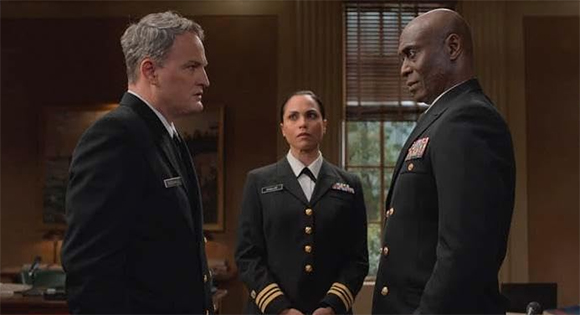The Caine Mutiny Court-Martial is the final film from director William Friedkin, known for such thrillers as The Exorcist, The French Connection, and Rules of Engagement. He is credited as writer with Herman Wouk, who wrote the 1954 play of the same name. The film unfolds much like a play, taking place entirely in one room.
This legal drama focuses on questions about military ethics and rules of conduct during times of great danger. Kiefer Sutherland stars as Lieutenant. Commander Queeg of the U.S.S. Caine who during a cyclone at sea was relieved of his command by his Executive Officer, Lieutenant Maryk (Jake Lacy). Maryk contends that Queeg was showing signs of mental illness and needed to be replaced lest his decisions cause the ship to founder. Now Maryk is facing court martial for mutiny.

Monica Raymund plays the lead Navy prosecutor who does all she can to paint a positive portrait of Queeg as a brave long-time Navy officer who has been unjustly treated by his judgmental crew. Jason Clarke puts in a strong performance as Lieutenant Greenwald, the defense attorney for Maryk. Members of the Caine’s crew give varying versions about events leading up to that fateful night, and testimonies by Queeg and Maryk create a confusing picture of the motivations behind Maryk’s behavior. Both Queeg’s and Maryk’s state of mind are called into question.
During a year in which one news story after another from Wall Street to Washington to wartime battlefields has raised questions about what is proper and improper conduct, this courtroom drama unfolds with a surprising contemporaneity. The themes intersect with our times and compel viewers to contemplate the meaning of leadership, the nature of responsibility, and the conflict between personal decision-making and adherence to the rules of the larger community.
